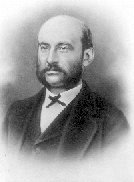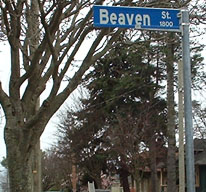What do the Papers Say?

Robert Beaven
Premier of British Columbia June 1882-Jan.
1883
Courtesy B.C. Archives: A-01990
It was 1878, and British Columbia had been part of the Dominion of Canada for almost seven years. The former colony still seemed to be grappling with its role in confederation, and both politician and constituents were puzzling out their roles with respect to each other and to Ottawa.
This segment from a good portion’s worth of column-space in the Colonist is likely an example of the creative criticism Beaven received as Chief Commissioner of Lands and Works. It deals with Beaven’s attempts to open up the tendering process for public works contracts.
While probably a work of satire, and thus, out of place in a discussion on Chinese spiritual life, the story does evoke the gratitude the Chinese community probably had for Beaven and the ire the white business community had for him. It also suggests the manner in which the Chinese community was perceived by the larger white community, and how strange the Chinese notion of worship probably seemed. Perhaps a statue was made of Beaven, although it now seems unlikely.
The transcription of the newspaper story has been broken up into smaller
paragraphs to aid reading.
 Daily British Colonist
21
March 1878
Daily British Colonist
21
March 1878
THE MODERN “JOSS.”
It is said when Mr. Beaven was in office the Chinese laborers employed on the public works were accustomed to worship him as their Joss. A person strolling through Cormorant street one fine afternoon discovered a wooden image wearing a bald head and store clothes and surrounded by lighted rushes and tapers, in one corner of a small shop. Something familiar about the face of the image attracted the stroller’s attention; and he accordingly asked one of the several Chinamen who were burning paper and performing incantations before the image who it was intended to represent.
The Chinaman paused in his devotions and thus delivered himself in the pigeon English: “You sabe Mistel Bleaven ? (The enquirer nodded acquiescence.) This man (pointing to the image) allee same Mistel Bleaven. You sabe loads ? (roads.) Plentee workee Blitish Columbee loads hiyou licee. Mistel Bleaven allee same Chineeman--heap likee cheap workee. Allee same Joss!” And the simple soul lighted a fresh scrap of paper and laid it as a burnt offering at the feet of this new “Gamaliel.”
The stroller, who was visibly effected by this touching tribute of affection to the Chief Commission of Lands and Works, paused long enough to drop a sympathetic tear on the brow of the image, and hurried away to narrate the incident as an instance of Chinese gratitude for favors received.
This little story is told because Mr. Beaven has placed on the notice board a resolution condemnatory of the Government for not giving out all public work by contract. The policy of the present Government has been to discourage the employment of Chinese in the fulfilment of public contracts. The policy of Mr. Beaven was to encourage by every means at his command the wholesale employment of this degraded and degrading class of laborers. Nearly the whole of the Westminster-Yale road was made by Chinamen under the contract system. The country swarmed with yellow pagans and not only did Mr. Beaven defend their employment, but the Standard declared that they were to be preferred to white laborers. If the present Government has not carried out the contract system in its integrity, it was to prevent as far as possible the absorption of public monies by “Mistel Bleaven’s” pagan worshippers. It were better for the country and society if 100 white men should find steady employment by the day on the roads than if 2,000 Chinamen were engaged on contract work. The modern Joss don’t agree with the Government; but we know that the people do.
(Follow-up article entitled: MR. BEAVEN IN THE ROLE OF A GENEROUS GIVER AWAY OF THINGS THAT DON’T BELONG TO HIM.)

Beaven Street in Fairfield area of Victoria; a short street in between two longer ones, somewhat analogous to Beaven's stint as Premier.
